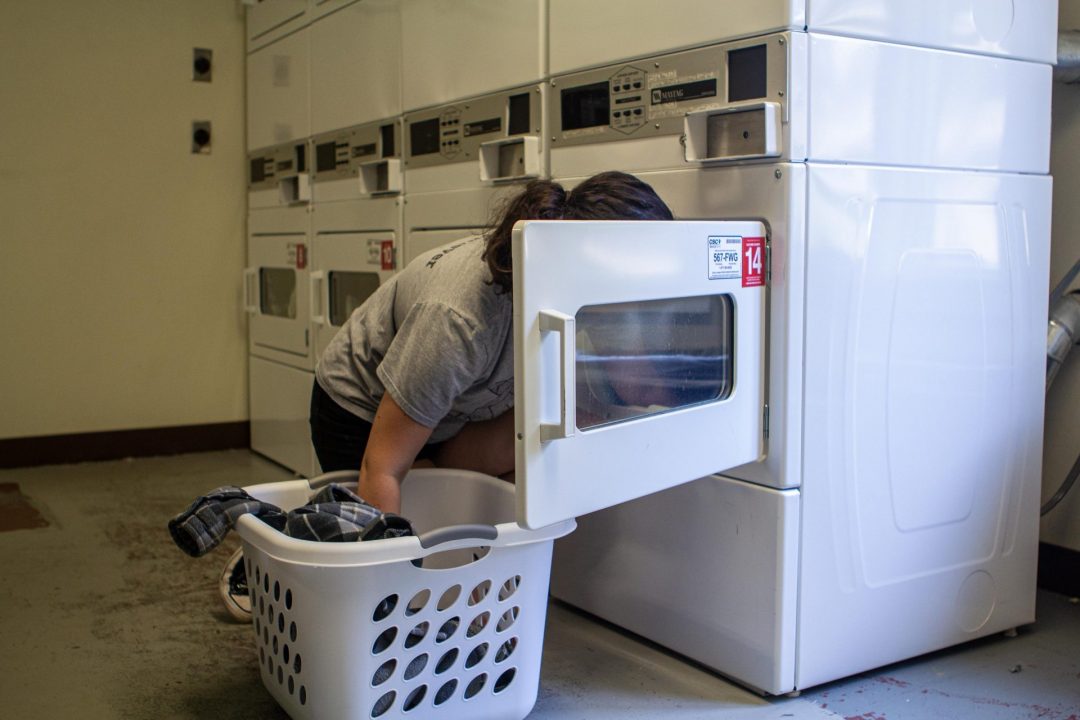Counting quarters before a laundry day is a quintessential part of the college experience for many students across the country. For students at the University of Maryland, Baltimore County, however, it no longer is. On July 30, about a month before the semester began, Residential Life sent a mass email to UMBC students announcing that the 2019-2020 school year would feature a brand new amenity: complimentary laundry for residential students.
For a select group of students, this is not unfamiliar; last year, students living in Patapsco and Chesapeake residential halls received free laundry for the spring semester after having the highest rates of completion for RSA’s Student Satisfaction Survey. This timeline is no coincidence, according to Dr. John Fox, the Director of Residential Life.
“In Residential Life, we invite student feedback related to their experiences, particularly through venues such as the RSA sponsored town halls,” said Fox. At a town hall last year, he explained, several students brought up problems with laundry: Some machines and card readers did not work, other machines ‘ate’ their quarters and other similar issues. This prompted a discussion between Fox and the Assistant Directors of ResLife, who discussed the idea of free laundry — what would it mean for room rates, how would students like it, what effect would it have on electricity and water usage?
A way to answer some of these questions arose when staff asked to offer free laundry as a reward for participation in the Student Satisfaction Survey, allowing ResLife to “pilot” the amenity and see what students thought of the program. According to Fox, it was “pretty evident” that students were excited about having free laundry. But what about the other concerns — cost and sustainability?
For cost, it is important to understand how UMBC laundry works in the first place. ResLife partners with a laundry vendor, CSC ServiceWorks, who provides and programs the washers and dryers as well as doing any necessary maintenance on the machines. In the past, UMBC would pay CSC for the use of their machines, and CSC would collect the revenue (quarters or campus card money) that students paid to use the machines. This system had been used at UMBC for many years, but recently, Fox learned that CSC offered an all-inclusive laundry program. Rather than CSC collecting the quarters from their machines, UMBC paid extra up-front, eliminating the need for students to pay for individual machine usage.
“Ultimately, part of my job is to make good decisions for the department that reflect what’s in the best interest for students as well as to be fiscally responsible,” Fox states.
Naturally, this feature did cost ResLife students, but not by much. Part of the student room fees already goes toward the utility costs of the washers and dryers, and this year, the cost of complimentary laundry was approximately 0.3 percent of room fees, according to Fox. This slight price increase, Fox believes, helps alleviate some of the stress of having to allot extra laundry money on top of paying for tuition, room and board, books, meal plans and more. Additionally, it takes away the hassle of collecting quarters or adding money to a campus card, increasing convenience.
But students might be wondering, “Is this worth it?” Are they paying more money for this “free” laundry than they would by using quarters or Retriever Dollars? The answer is not so simple, as it depends largely on how much laundry students do, which varies considerably.
Students who did one washer and one dryer cycle per week for every one of the 16 weeks of the semester would have spent $40 on laundry; by contrast, 0.3 percent of student room rates for one semester amounts to $11.38 for residence halls and $14.66 for non-Walker apartments (equivalent to 9.1 or 11.7 $1.25-washer or dryer cycles, respectively) (calculations made according to the 2019-2020 Undergraduate Cost Calculator).
Even for students who, as observed by Fox and other ResLife employees, would spend weekends at home to do laundry, this service is beneficial: The cost of having and operating washers and dryers is included in student room fees, so those students would previously have been paying to maintain machines that they did not use. In fact, Fox stated that part of the addition of complimentary laundry was to incentivize students to stay on campus on the weekends.
Overall, Fox “initiated the change because the benefits outweighed concerns,” notably, sustainability. However, sustainability was not measured or tracked in the pilot program of Chesapeake and Patapsco. Though ResLife does track water and electricity usage across campus, they do this per square footage, making it difficult for them to see if usage increased in the specific buildings that received free laundry last year. Additionally, CSC can track the amount of washer or dryer cycles used by each dormitory — even machine — on request, though ResLife typically does not make that request because student machine usage “hasn’t really been a question that we needed to ask” in the past, according to Fox. But even during the pilot program at Chesapeake and Patapsco, ResLife did not request those numbers for the 2019 spring semester, as they felt that only one semester at two dorms was not a strong enough sample size to compare data.
Because of this lack of data, Fox is concerned about the possibility that complimentary laundry is increasing the campus’s carbon footprint. He plans to request and analyze the washer/dryer usage numbers from this semester to see if there is a significant increase in water or electricity usage as a result of the free laundry program. Only time will tell how this new amenity will affect the campus’s sustainability, but given the recent climate strikes and emphasis on sustainability, it is something that ResLife will certainly have to pay increased attention to.
Photo: Free laundry is projected to cost less for a student that uses one wash and one dry cycle per week than paying $1.25 per cycle. Photos by Brent Bemiller.

